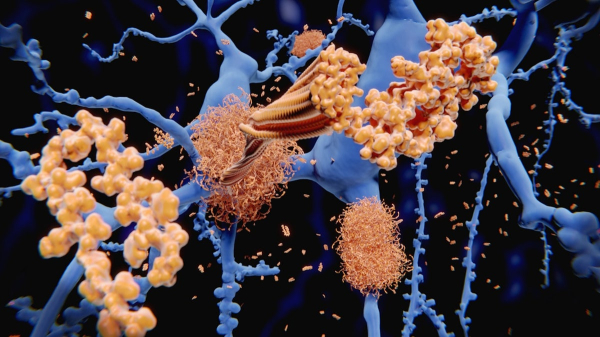Alzheimer’s pill could reduce brain decline in some high-risk patients, trial suggests

An experimental pill could slow memory loss and brain shrinkage in some Alzheimer’s patients, new research suggests.
The pill, called ALZ-801 (valiltramiprosate), was shown to be effective in people who have early Alzheimer’s disease and two copies of the APOE4 gene, which increases Alzheimer’s risk by 10 times.
Researchers at Alzheon, Inc., a Massachusetts biotech company, conducted a phase 3 trial that included 325 people with early Alzheimer’s — either mild cognitive impairment (MCI) or mild dementia — all of whom carried the APOE4 gene, according to a press release.
HE CARRIES THE ALZHEIMER’S GENE BUT NEVER GOT THE DISEASE — SCIENTISTS WANT TO KNOW WHY
The participants, whose ages ranged from 50 to 80, were randomly given either ALZ-801 pills or a placebo for about 18 months.
In the overall group, ALZ-801 showed some slowing of memory and cognitive decline, but the difference wasn’t statistically significant.

In just people with the earliest stages of Alzheimer’s who had mild cognitive impairment, however, the pill appeared to slow memory decline by 50% and to stop nearly all daily cognitive decline.
“Individuals diagnosed with MCI experience a decline in cognitive abilities, including memory, language or visual/spatial perception — however, they maintain the ability to independently perform most activities of daily living,” Christopher Weber, Ph.D., senior director of global science initiatives at the Alzheimer’s Association in Chicago, who was not part of the study, told Fox News Digital.
ALZHEIMER’S RESEARCHERS SAY TARGETING BRAIN SUGAR COULD HELP PROTECT AGAINST DEMENTIA
People taking the twice-daily pill also had slower brain shrinkage — particularly in the hippocampus, which controls memory and thinking, the atrophy was about 18% less than those taking the placebo.
The results were published in the medical journal Drugs.

The primary side effects reported included nausea, vomiting and appetite suppression, according to the researchers.
The experimental pill could eventually serve as an at-home alternative to the currently approved Alzheimer’s drugs, lecanemab or donanemab, both of which require IV infusions.
“It may well have a future as part of the growing arsenal of anti-Alzheimer’s drugs.”
The current drugs, which are monoclonal antibody treatments designed to break down amyloid plaques in the brain, have also been linked to brain swelling and bleeding. That side effect was not seen with ALZ-801, which works by preventing amyloid plaques from forming in the first place.
STUDY REVEALS WHY ‘SUPER AGERS’ MAINTAIN ‘OUTSTANDING MEMORY’ INTO THEIR 80S
“In this trial, the fact that APOE-ε4/ε4 individuals did not show increased brain bleeding or swelling is encouraging, and suggests that this drug may be relatively safe in a population that is otherwise at higher risk of side effects,” Weber noted.
CLICK HERE TO DOWNLOAD THE FOX NEWS APP
Dr. Marc Siegel, Fox News senior medical analyst, echoed this advantage.
“This drug can be given before the plaques fully form, so that prevention may be a goal,” Siegel, who also was not involved in the study, told Fox News Digital. “As a result, we don’t see the brain swelling that is sometimes a side effect of the plaque-dissolving monoclonal antibodies.”

The study did have some limitations, the researchers noted — primarily that the strongest results were only seen in the earliest-stage group and not across all participants.
The trial also included only carriers of the APOE4 gene, which comprises about 15% of Alzheimer’s patients.
CLICK HERE TO SIGN UP FOR OUR HEALTH NEWSLETTER
The study was also relatively short, with longer follow-up trials needed to confirm the results.
Weber reiterated that the primary and secondary outcomes of the trial were negative.
“That said, follow-up analyses with specific subgroups were encouraging, including that the treatment did cause significant slowing of shrinkage in the hippocampus, which is a section of the brain that has a hugely important role in memory,” he told Fox News Digital.
TEST YOURSELF WITH OUR LATEST LIFESTYLE QUIZ
One encouraging aspect of this experimental drug, according to Weber, is its potential to complement other drugs that treat early Alzheimer’s disease.
“This treatment could potentially be used in combination with other anti-amyloid treatments, though more evidence is needed to understand how this drug could be used as a part of a combination therapy,” he said.

“Given the relatively small size of this subgroup, it will be important to validate these findings in larger, longer clinical trials.”
Siegel agreed that the drug could have potential. “It may well have a future as part of the growing arsenal of anti-Alzheimer’s drugs, which look at several different targets of prevention, including beta amyloid and tau plaques as well as neuro-inflammation,” he said.
CLICK HERE FOR MORE HEALTH STORIES
The study was funded by Alzheon, Inc., maker of ALZ-801, and supported by a U.S. National Institute on Aging grant.
Melissa Rudy is senior health editor and a member of the lifestyle team at Fox News Digital. Story tips can be sent to melissa.rudy@fox.com.

